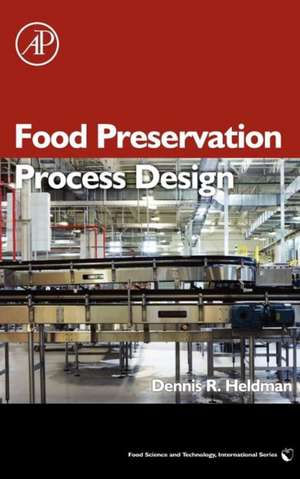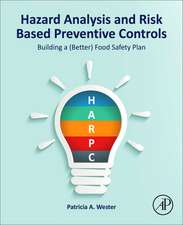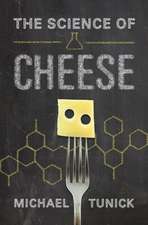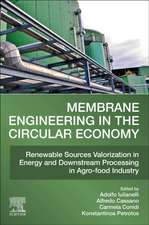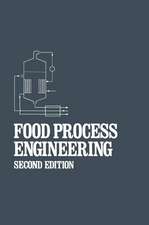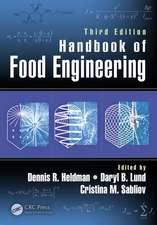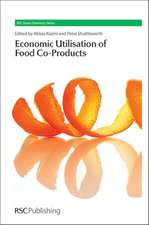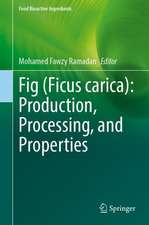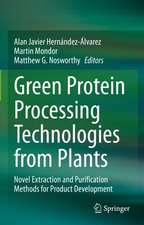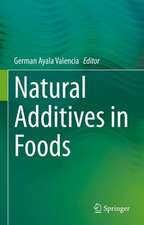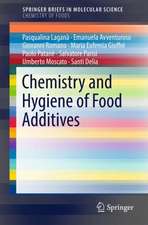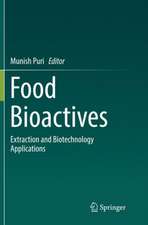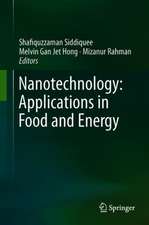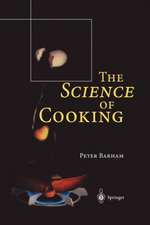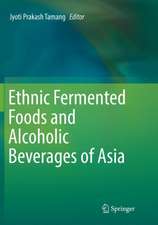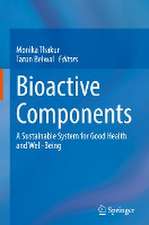Food Preservation Process Design: Food Science and Technology
Autor Dennis R. Heldmanen Limba Engleză Hardback – 4 apr 2011
The new dimension to be emphasized is the emerging technologies for preservation of foods and the need for sound base of information to be developed as inputs for systematic process design. The focus of the work is on process design, and emphasizes the need for quantitative information as inputs to process design.
The concepts presented build on the successful history of thermal processing of foods and use many examples from these types of preservation processes. Preservation of foods by refrigeration, freezing, concentration and dehydration are not addressed directly, but many of the concepts to be presented would apply. Significant attention is given to the fate of food quality attributes during the preservation process and the concept of optimizing process parameters to maximize the retention of food quality.
- Focuses on Kinetic Models for Food Components
- Reviews Transport Models in Food Systems
- Asseses Process Design Models
Din seria Food Science and Technology
- 25%
 Preț: 618.61 lei
Preț: 618.61 lei - 22%
 Preț: 1024.09 lei
Preț: 1024.09 lei -
 Preț: 357.25 lei
Preț: 357.25 lei - 22%
 Preț: 842.01 lei
Preț: 842.01 lei - 23%
 Preț: 553.64 lei
Preț: 553.64 lei - 15%
 Preț: 490.10 lei
Preț: 490.10 lei - 18%
 Preț: 1359.95 lei
Preț: 1359.95 lei - 18%
 Preț: 1674.26 lei
Preț: 1674.26 lei - 8%
 Preț: 323.02 lei
Preț: 323.02 lei - 30%
 Preț: 614.87 lei
Preț: 614.87 lei - 18%
 Preț: 2090.27 lei
Preț: 2090.27 lei - 15%
 Preț: 489.26 lei
Preț: 489.26 lei - 29%
 Preț: 1408.52 lei
Preț: 1408.52 lei - 23%
 Preț: 566.29 lei
Preț: 566.29 lei - 13%
 Preț: 385.35 lei
Preț: 385.35 lei - 15%
 Preț: 498.29 lei
Preț: 498.29 lei - 30%
 Preț: 2111.13 lei
Preț: 2111.13 lei - 18%
 Preț: 1827.77 lei
Preț: 1827.77 lei - 18%
 Preț: 2081.08 lei
Preț: 2081.08 lei - 18%
 Preț: 2212.49 lei
Preț: 2212.49 lei - 18%
 Preț: 2220.38 lei
Preț: 2220.38 lei - 18%
 Preț: 2221.95 lei
Preț: 2221.95 lei - 23%
 Preț: 606.02 lei
Preț: 606.02 lei - 18%
 Preț: 2078.06 lei
Preț: 2078.06 lei - 23%
 Preț: 415.15 lei
Preț: 415.15 lei - 18%
 Preț: 2102.06 lei
Preț: 2102.06 lei - 23%
 Preț: 376.17 lei
Preț: 376.17 lei - 18%
 Preț: 1604.01 lei
Preț: 1604.01 lei - 18%
 Preț: 2770.03 lei
Preț: 2770.03 lei - 18%
 Preț: 1313.74 lei
Preț: 1313.74 lei - 15%
 Preț: 537.13 lei
Preț: 537.13 lei - 18%
 Preț: 2211.41 lei
Preț: 2211.41 lei - 18%
 Preț: 2233.32 lei
Preț: 2233.32 lei - 27%
 Preț: 1420.06 lei
Preț: 1420.06 lei - 18%
 Preț: 1395.65 lei
Preț: 1395.65 lei - 31%
 Preț: 1702.47 lei
Preț: 1702.47 lei - 18%
 Preț: 1926.00 lei
Preț: 1926.00 lei - 29%
 Preț: 1409.34 lei
Preț: 1409.34 lei - 18%
 Preț: 1800.14 lei
Preț: 1800.14 lei - 18%
 Preț: 1336.46 lei
Preț: 1336.46 lei - 18%
 Preț: 1959.17 lei
Preț: 1959.17 lei - 31%
 Preț: 1690.32 lei
Preț: 1690.32 lei - 22%
 Preț: 836.17 lei
Preț: 836.17 lei - 18%
 Preț: 1941.91 lei
Preț: 1941.91 lei - 18%
 Preț: 1222.82 lei
Preț: 1222.82 lei - 18%
 Preț: 701.01 lei
Preț: 701.01 lei
Preț: 736.63 lei
Preț vechi: 1009.08 lei
-27% Nou
140.97€ • 153.07$ • 118.42£
Carte tipărită la comandă
Livrare economică 22 aprilie-06 mai
Specificații
ISBN-10: 0123724864
Pagini: 368
Dimensiuni: 152 x 229 x 28 mm
Greutate: 0.7 kg
Editura: ELSEVIER SCIENCE
Seria Food Science and Technology
Public țintă
The primary audience will be food science professionals; any organization or meeting that provides contacts with these potential users of the book would be appropriate. There should be a significant audience in the food industry as new and emerging process technologies are evaluated and commercialized.The book will also be of interest as reference/suggested reading to students in the advanced level; graduate courses in the short term (3-5 years) and undergraduate courses in the longer term.
Cuprins
1. Introduction 2. Kinetic Models for Food Systems 3. Kinetics of Inactivation of Microbial Populations 4. Kinetics of Food Quality Attribute Retention 5. Physical Transport Models 6. Process Design Models 7. Process Validation and Evaluation 8. Optimization of Preservation Processes 9. Designing Processes in the Future
Descriere
The preservation processes for foods have evolved over several centuries, but recent attention to non-thermal technologies suggests that a new dimension of change has been initiated.
The new dimension to be emphasized is the emerging technologies for preservation of foods and the need for sound base of information to be developed as inputs for systematic process design. The focus of the work is on process design, and emphasizes the need for quantitative information as inputs to process design.
The concepts presented build on the successful history of thermal processing of foods and use many examples from these types of preservation processes. Preservation of foods by refrigeration, freezing, concentration and dehydration are not addressed directly, but many of the concepts to be presented would apply. Significant attention is given to the fate of food quality attributes during the preservation process and the concept of optimizing process parameters to maximize the retention of food quality.
- Focuses on Kinetic Models for Food Components
- Reviews Transport Models in Food Systems
- Asseses Process Design Models
